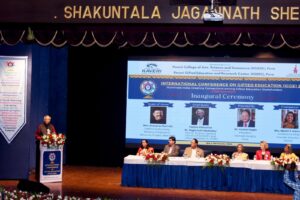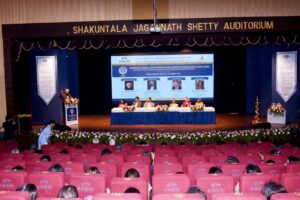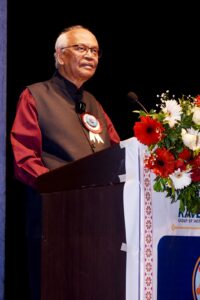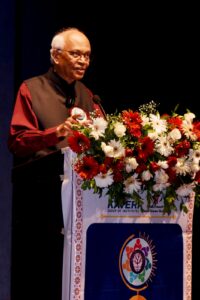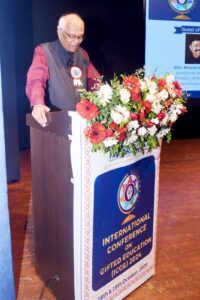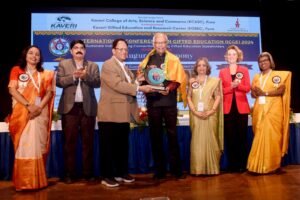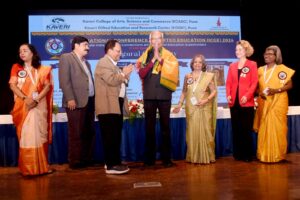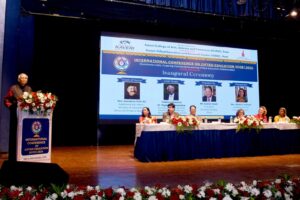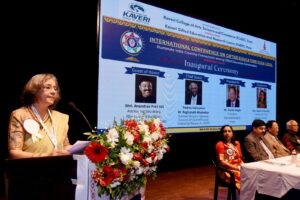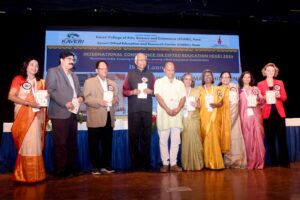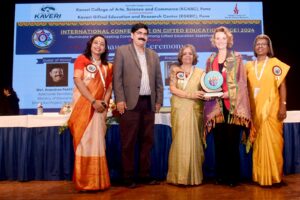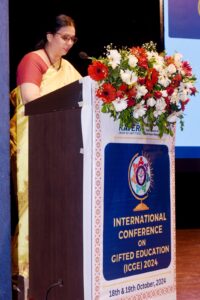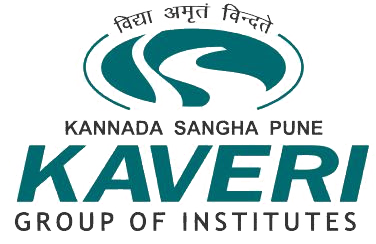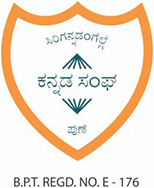International Conference on Gifted Education (ICGE) 2024 Day 1
Kaveri College of Arts, Science and Commerce in association with Kaveri Gifted Education and Research Centre organised a two-days International Conference on Gifted Education 2024 themed “Illuminate India: Creating Connections for Gifted Education Stakeholders” on 18th and 19th October 2024. The event began with Dr. Deepa Sathe HOD Commerce department warmly welcomed the dignitaries, followed by a Saraswati Pooja performed by the dignitaries, invoking blessings for wisdom and success. After the pooja, a soulful song was presented by students of Kaveri College of Arts, Science and Commerce adding a cultural touch to the ceremony and delighting the audience. The first day of the conference began with Malati Kalmadi delivering the welcome address, introducing the vision and purpose of the Kaveri Gifted Education and Research Center (KGERC). She emphasized the importance of nurturing gifted children by identifying their potential and fostering their growth in a structured, meaningful way. She said “It is indeed very gratifying to see that Dr. Mashelkar inaugurated KGERC and today when we are celebrating 10 years by way of organizing this international conference, he is the Chief Guest. The attention for gifted education is increasing globally with over 21 countries in the world having policies in place for the same. NEP 2020 has some related elements but a lot more attention is required to create a thoughtfully designed structure and framework for gifted education so that gifted children get the opportunity that they deserve.We have set up Talent Hubs in the institutions of Kaveri Group that focus on identifying potential on parameters like STEM (Science, technology, engineering, and mathematics) and Art sector at an early stage.
The conference’s platform aimed to provide insights on how educational policies like the National Education Policy (NEP) can support gifted education in India by aligning with global standards. The session stressed the value of critical thinking, qualities of gifted children, and the need for holistic development through collaboration.
KGERC’s vision was explained in detail, focusing on addressing the gap in gifted education. The center works to create talent hubs within schools and educational institutions, ensuring that children with exceptional abilities are recognized early and provided with the right environment to thrive. Their approach is driven by values, aiming to nurture children who will contribute meaningfully to society. KGERC also collaborates internationally to exchange best practices in gifted education, ensuring that children have access to the necessary resources and support systems.
The role of educators and parents emerged as a key theme throughout the day. Educators initially experience discomfort when dealing with gifted children but gradually grow more comfortable with the right tools and strategies. Parents were encouraged to motivate their children and avoid limiting them with rigid expectations. The session emphasized that children should be allowed to explore freely, without being confined to predefined paths.
A special moment in the day was the book launch. Ms. Sumathi Srinivasan, who lauded the efforts of KGERC and highlighted the organization’s 30 years of expertise in the field and praised the leadership of Dr. Devsena, whose passion has been pivotal in advancing gifted education. She said Dr. Devsena Desai has co-authored numerous books and a podcast on spotify for raising awareness on giftedness. ‘Nurturing Buddhiman Children – A Practitioner’s Guide’ was released on the occasion. This book is jointly authored by Dr Devasena Desai, Dr. Sameena Manasawala, and Dr. Paromita Roy. The book is published by Kaveri Gifted Education and Research Center and Vishwakarma Publications. Dr. Sameeena Manasawala and Dr. Devasena Desai were felicitated at the hands of Dr. Raghunath Mashelkar for their outstanding contribution to this field of gifted education.
Dr. Deepa Sathe introduced Chief Guest Padma Vibhushan Dr. Raghunath Mashelkar. Felicitation of Dr. Raghnath Mashelkar was done by Mr. Kushal Hegde, President, Kannada Sangha. In a keynote address by Dr. Mashelkar shared his personal journey, emphasizing how mentorship and scholarships played a transformative role in his life. Dr. Mashelkar emphasized that every child has innate creativity, which must be nurtured from an early age to ensure it remains alive throughout adulthood. He shared his experiences of overcoming challenges and underscored the importance of teaching children not only how to think but also what to think. His story of receiving the Tata scholarship and achieving success through perseverance resonated deeply with the audience. Dr. Mashelkar’s closing message stressed that nurturing giftedness requires a combination of values, skills, and opportunities, with parents playing a pivotal role as honorary mentors in their children’s lives. The importance of continuous learning and innovation, beginning from childhood. Participants were reminded that the role of parents, educators, and mentors is critical in helping children unlock their potential and pursue their passions fearlessly.
Dr. Devasena Desaid introduced Dr. Heidrun Stoeger and Mrs. Malati Kalmadi felicitated her. She said she is taking up projects in mentoring and talent development. She further added that Mentoring is a stable and dynamic relationship between the less experienced and more experienced. She further speaks about meta-analysis and presets to the audience her two studies in gifted education. She focused on mentoring as a vital tool for talent development. It was emphasized that mentoring involves more than just skill-building; it requires continuous evaluation and effort from both mentors and mentees. Dr. Stoeger mentioned three stages of talent developing and mentoring:
- Developing a love for the topic, idea, or discipline.
- Building domain interest, knowledge, and basic skills.
- Acquiring advanced skills and deep expertise.
The discussions stressed that teaching routines and best practices are essential in creating a learning environment that encourages growth. Mentorship is not easy, but it lays the foundation for sustained talent development through structured guidance.
A significant part of the conference focused on mentoring as a means of empowering students. Dr. Stoeger presented two major initiatives—Cyber (2005) and Global Star Mentoring (2017)—that provide students with personalized guidance over extended periods. Cyber Mentoring focuses on one-on-one mentoring, fostering relationships between students and Mentor
The Global Star Mentoring program involves a multi-year commitment, helping students build leadership skills and achieve personal growth. Dr. Stoeger emphasized that mentors often act as “door openers,” creating new opportunities for students and providing them with the necessary guidance to navigate their journeys. She shared videos showcasing recent mentoring projects, illustrating how close relationships between mentors and mentees significantly enhance learning outcomes.
The program goes ahead with Dr. Mantak Yuen virtual keynote address on exploring the meaning, hope and social connectedness in Asian Gifted learners. Dr. Sameena Mansawala introduces Dr. Mantak Yuen. Dr. Yuen begins by giving the overview of his presentation. He talked about what are the benefits of assessing hope and meaning in life. He said hope is very important in times of difficulty and sadness. He added that once you choose hope anything is possible. He discussed the meaning of life is not to find oneself but to create oneself. He further elaborates on social connectedness. The interaction with friends, family and colleagues are very important. Dr. Yuen shares two studies about the study on hope and meaning of life. This session highlighted the idea that effective mentoring is about more than academic support—it involves building trust and offering long-term developmental opportunities.
Dr. Yuen further shared how schools in Hong Kong adapted during the pandemic. The discussion focused on the experiences of primary and gifted students, illustrating how learning was kept on track through innovative strategies. One of the key takeaways was the importance of personalized schedules that allowed students to manage their time effectively while dealing with disruptions.
Panel Discussion on NEP 2020
Post Lunch the event began with the felicitation of Pallavi Naik by Malati Kalamdi,. After this, Pallavi Naik introduced Dr. Leena Wadia, highlighting her achievements and her contribution. Dr. Devsena Desai felicitated Dr. Leena Wadia with a token of honor. The event continued with Dr. Devsena Desai also felicitating Dr. Pankaj Jain, appreciating his efforts and presenting him with a token of recognition.
The opening session, led by Dr. Leena Wadia, set the tone for the event by emphasizing the importance of achieving balance and equality in education. She argued that every learner, regardless of background or ability, should have equal access to learning opportunities. Dr. Wadia stressed that the education system needs to move beyond rigid structures to ensure that students develop holistically.
Building on this theme, Dr. Pankaj Jain highlighted the role of curiosity in driving effective learning. He advocated for expanding education beyond the confines of the classroom and encouraged teachers to adopt diverse styles that suit different learners. According to him, a flexible teaching-learning process nurtures curiosity and makes learning more enjoyable and meaningful. His talk urged educators to foster experiential learning by creating environments where students can explore, ask questions, and grow beyond textbooks.
One of the key points discussed was the burden of an overly packed curriculum, which often leaves little room for creativity and independent thinking. Dr. Leena Wadia argued that reducing the amount of content in the curriculum would give students the time and space to develop essential skills. Instead of focusing on rote memorization, she emphasized the need to teach students “how to learn.” This shift toward self-directed learning encourages students to take ownership of their education, preparing them for lifelong learning and future challenges.
This session underscored that a more focused curriculum, aligned with core learning objectives, helps reduce stress and fosters deeper understanding. It encouraged schools to rethink their teaching methodologies to prioritize skill development over content delivery.
The panel stressed that mentors played a critical role in supporting students during this period, guiding them to stay motivated and creative despite the uncertainties. These experiences demonstrated how adaptive learning environments can help students remain engaged and resilient during difficult times, underscoring the value of flexibility in education.
The event included an engaging Q&A session facilitated by Dr. Pallavi Naik, where participants had the opportunity to interact with the panelists. This segment encouraged audience members to ask questions and share insights, fostering a lively exchange of ideas. The session not only addressed various challenges in education but also provided practical solutions that participants could apply in their contexts.
On the first day of conference 16 research papers were presented by the participants.
